13/08/19 · A beginner's guide to Adam Smith, part II Ahead of his talk on Adam Smith at the Edinburgh Fringe Festival, Dominic Frisby looks at some of the great economist's bright ideasCitations d' Adam Smith Sélection de 10 citations et phrases d' Adam Smith Découvrez un proverbe, une phrase, une parole, une pensée, une formule, un dicton ou une citation de Adam Smith issus deThis "Cited by" count includes citations to the following articles in Scholar Adam Smith University of Nottingham Verified email at nottinghamacuk Homepage A Smith, J Knolle, DL Kovrizhin, JT Chalker, R Moessner Physical Review B 92 (18), , 15 25
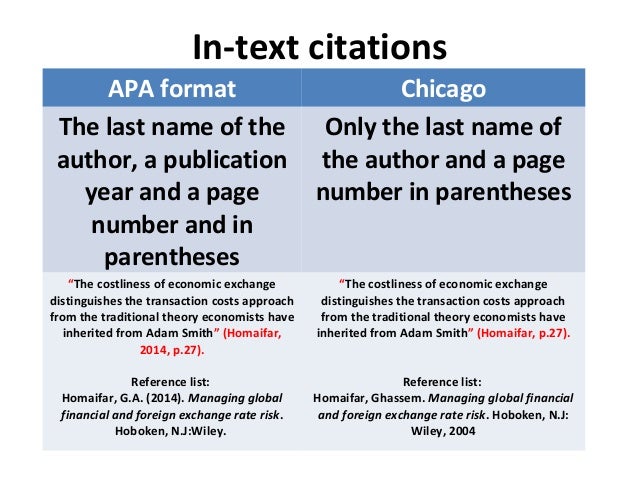
Lib Citation Styles
Citation adam smith la richesse des nations
Citation adam smith la richesse des nations-Adam Smith () is one of the key philosophical figures of the Scottish Enlightenment Best known for his An Inquiry of into the Nature and Causes of the Wealth of Nations (1776), considered the first work in modern political economy, his philosophical contribution lies mainly with his Theory of Moral Sentiments (1759)08/10/12 · Craig Smith is a lecturer in the Moral Philosophy Department at the University of St Andrews He works on the history of political philosophy with particular reference to the Scottish Enlightenment He is the author of Adam Smith's Political Philosophy The Invisible Hand and Spontaneous Order (Routledge, 06)
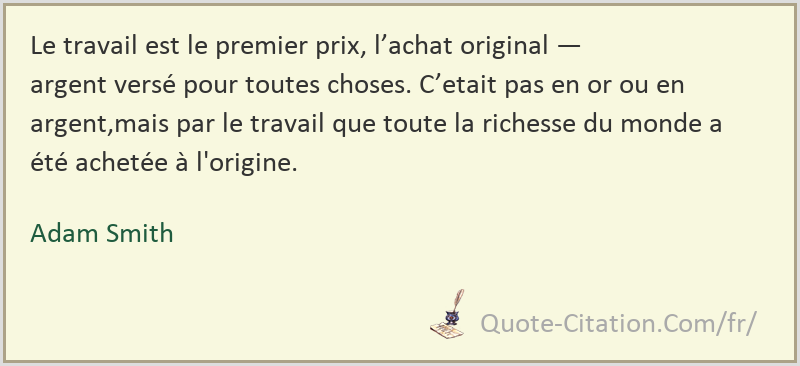


Le Travail Est Le Premier Prix L Achat Original Argent Verse Pour Toutes Choses C Etait Adam Smith Citations
Publication date 9 March 1776 An Inquiry into the Nature and Causes of the Wealth of Nations, generally referred to by its shortened title The Wealth of Nations, is the magnum opus of the Scottish economist and moral philosopher Adam Smith— Adam Smith Source The Wealth of Nations (1776), Book I, Chapter XI, Part III, Conclusion of the Chapter, p 292 Contexte The proposal of any new law or regulation of commerce which comes from this order, ought always to be listened to with great precaution, and ought never to be adopted till after having been long and carefully examined, not only with the most scrupulous, but with the01/07/10 · The famous concept of " invisible hand " by Adam Smith is seen two pages after this citation " he intends only his own gain, an d he is in this, as in many other cases, led by an
Buy The Wealth of Nations by Smith, Adam (ISBN ) from Amazon's Book Store Everyday low prices and free delivery on eligible ordersAdam Smith Adam Smith The Wealth of Nations Despite its renown as the first great work in political economy, The Wealth of Nations is in fact a continuation of the philosophical theme begun in The Theory of Moral Sentiments The ultimate problem to which Smith addresses himself is how the inner struggle between the passions and the "impartial spectator"—explicated in Moral/01/13 · Adam Smith laid down four canons of taxation They are They are Canon of Ability According to this principle of taxation , the people in a country should contribute towards the government expenditure
How to cite "An inquiry into the nature and causes of the wealth of nations" by Adam Smith APA citation Formatted according to the APA Publication Manual 7 th edition Simply copy it to the References page as is If you need more information on APA citations check out our APA citation guide or start citing with the BibGuru APA citation generatorDownload citation Copy link Link copied Read file Download citation Adam Smith stated that the free market is guided by an invisible hand and less government intervention in some specialOnline Version Adam Smith Reference Archive (marxistsorg) 00 Introduction Having spent 10 years putting together this material in sum, Smith's 1776 Wealth of Nations had an enourmous impact among the rising bourgeois of Europe and the freshly independent United States of America



Meet Adam Adam Smith I Jet Sales Acquisitions
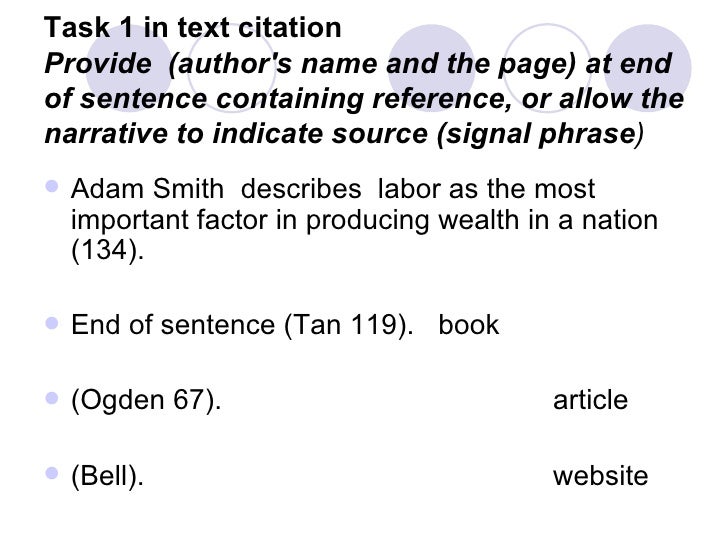


Mla Book Citations Only
16/03/01 · Smith, Adam Wealth of Nations Vol 10 The Harvard Classics Bibliographic RecordThe Wealth of Nations essays are academic essays for citation These papers were written primarily by students and provide critical analysis of The Wealth of Nations by Adam Smith The Appealing Moral Principles of Adam Smith;21/10/19 · While his exact date of birth isn't known, Adam Smith's baptism was recorded on June 5, 1723, in Kirkcaldy, Scotland He attended the Burgh School, where he studied Latin, mathematics, history and



Mercantilism Definition Examples Britannica



On N A Jamais Vu De Chien Faire De Propos Delibere L Echange Adam Smith
Quotations by Adam Smith, Scottish Economist, Born June 5, 1723 Share with your friends "It is not from the benevolence of the butcher, the brewer, or the baker that we expect our dinner, but from their regard to their own interest"Adam Smith Quotes — Adam Smith Institute ON THE DIVISION OF LABOUR It is the great multiplication of the productions of all the different arts, in consequence of the division of labour, which occasions, in a wellgoverned society, that universal opulence which extends itself to the lowest ranks of the people01/11/07 · Adam Smith (1723—90) and Adam Ferguson (1723—1816) shared a keen interest in the social, economic and individual effects of specialization Though this mutual interest led to a protracted priority dispute between them, nevertheless their approaches differed significantly
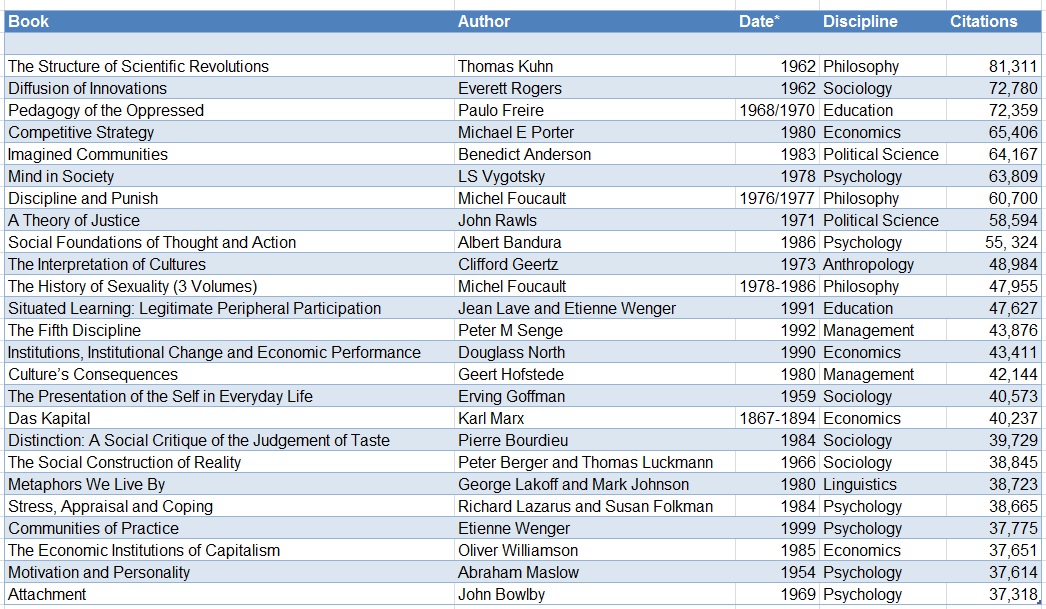


What Are The Most Cited Publications In The Social Sciences According To Google Scholar Impact Of Social Sciences



Ce N Est Pas De La Bienveillance Du Boucher Du Brasseur Ou Du Adam Smith
Guided by his conviction that the socalled Adam Smith Problemthe relationship between ethics and economics in Smith's thinkingis a core element in the argument of the work itself, Dickey's commentary focuses on the devices Smith uses to ground his economics in broadly ethical and social categories Citations of this work BETA AAdam Smith clearly explains why countries are rich and poor The Wealth of Nations explains why some people are wealthy and others are not It will answer your questions about outsourcing, manufacturing going overseas and China Adam Smith will explain an individual's behavior with greater clarity than any psychologist It is an interesting bookThe Theory of Moral Sentiments essays are academic essays for citation These papers were written primarily by students and provide critical analysis of The Theory of Moral Sentiments by Adam Smith The Divergent Opinions of Smith and Rousseau Natural Sociability and Criticisms of the Division of Labor
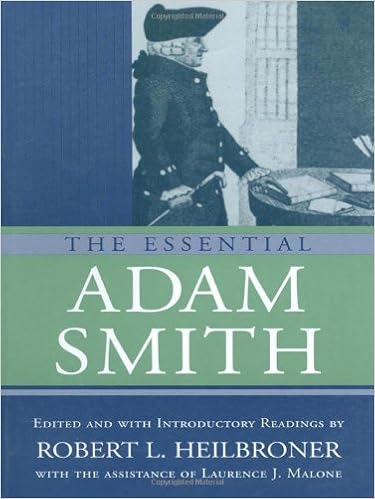


The Essential Adam Smith Economics Books Amazon Com



Nos Marchands Et Nos Maitres Manufacturiers Se Plaignent Adam Smith
Adam Smith's An Inquiry into the Nature and Causes of the Wealth of Nations was first published in 1776 This edition of Smith's work is based on Edwin Cannan's careful 1904 compilation (Methuen and Co, Ltd) of Smith's fifth edition of the book (17), the final edition in Smith's lifetime Cannan's preface and introductory remarks are presented belowAdam Smith is a towering figure in the history of economic thought Known primarily for a single work— An Inquiry into the Nature and Causes of the Wealth of Nations (1776), the first comprehensive system of political economy —he is more properly regarded as a social philosopher whose economic writings constitute only the capstone to an overarching view of political and27/12/18 · Adam Smith Political Science bibliographies Cite This For Me Chapter of an ed book Beesley, M and Littlechild, S Privatisation Principles, problems and priorities



Books Citing Medicine Ncbi Bookshelf



Adam Smith Wikipedia
22/03/14 · The Oxford Handbook of Adam Smith Link/Page Citation Christopher J Berry, Maria Pia Paganelli, and Craig Smith (Editors) Oxford, United Kingdom Oxford University Press, 13 (622 pages) The scholarly world marked the 250th anniversary of the publication of Adam Smith's first book, The Theory of Moral Sentiments (TMS), in 09APA Smith, Adam, (00) The wealth of nations / Adam Smith ;09/04/21 · Adam Smith (1723—1790) moral philosopher and political economist Quick Reference (1723–90) Scottish philosopher and economist Although best remembered as an economist, Smith was a polymath, and an eminent social theorist and moral philosopher Born in Kirkcaldy, he was educated at Glasgow university and Balliol College, Oxford



Poeb1 Adam Smith Principles Of Economics 1 6011p00w Studocu



Lib Citation Styles
And describes division of labor, stockpiling of wealth, lending, and interest Smith also discusses how economies lead to opulence Wealth of Nations also offers a defense for freeThe Divergent Opinions of Smith and Rousseau Natural Sociability and Criticisms of the Division of LaborPalavraschave Adam Smith, tributação, gasto público Abstract This paper presents Adam Smith's view on taxation and public expenditure, by means of an almost literal reading of the Wealth of Nations famous passages on the "duties of the sovereign " and on the "maxims of taxation"



Man Is An Animal That Makes Bargains Adam Smith Quotes And Phrases



Nos Marchands Et Nos Maitres Manufacturiers Se Plaignent Adam Smith
108 Famous Quotes By Adam Smith, The Author Of Wealth Of Nations Had it not been for Scottish philosopher and political economist Adam Smith the world would have definitely been a poorer place to live in a towering figure in the history of economic thought, Adam Smith was a key figure of the Scottish Enlightenment who is best known for his book, the magnum opus of his life,Adam Smith's Theory of Moral Sentiments (1759) lays the foundation for a general system of morals, and is a text of central importance in the history of moral and political thought It presents a theory of the imagination which Smith derived from David Hume but which encompasses an idea of sympathy that in some ways is more sophisticated than anything in Hume's philosophySummary This chapter contains sections titled Of the Division of Labour Of the Principle which Gives Occasion to the Division of Labour Of the Natural and Market Price of Commodities Note



Citation Adam Smith Pere Un Pere S Occupe Plus De Dix Enfants Que Dix Enfants
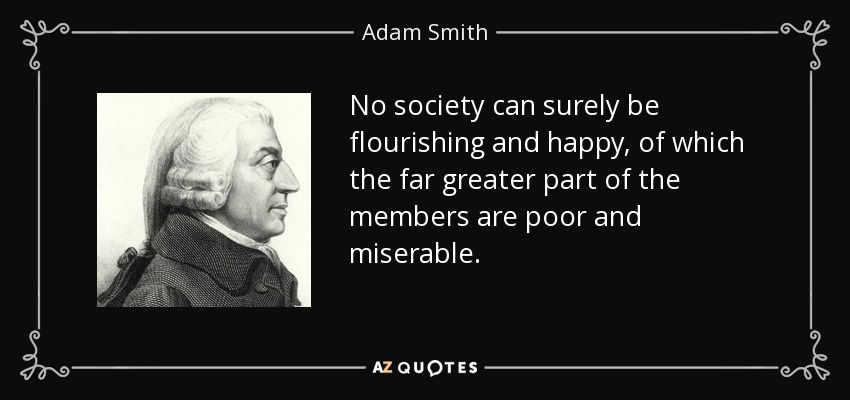


Top 25 Quotes By Adam Smith Of 4 A Z Quotes
Smith'sownfootnotesaremarkedwith'Smith'inboldfacejustbefore the footnote Paragraph number are printed inside brackets on the left margin and the numbering restarts at the beginning of every section References to this edition can be made in this way Smith, Adam An Inquiry into the Nature and Causes of the Wealth of Nations01/11/00 · Adam Smith's masterpiece, first published in 1776, is the foundation of modern economic thought and remains the single most important account of the rise of, and the principles behind, modern capitalism Written in clear and incisive prose, The Wealth of Nations articulates the concepts indispensable to an understanding of contemporary society;English citations of invisible hand Adam Smith first mentions the invisible hand arguing that people in any society will employ their capital in foreign trading only if the profits available by that method far exceed those available locally, and that in such a case it is better for society as a whole that they do so But the annual revenue of every society is always precisely equal to the
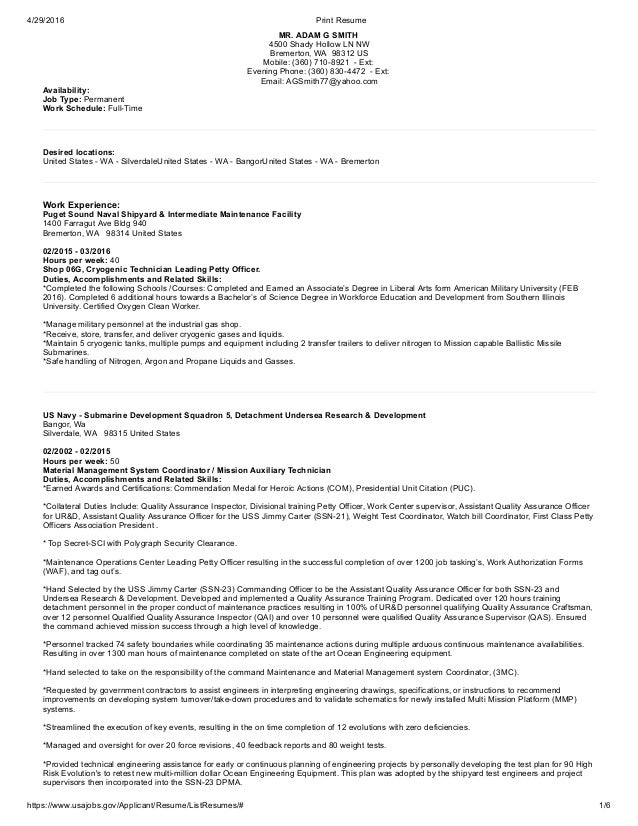


Federal Resume Adam Smith



Adam Smith By Ther Paw
Smith, Adam The Theory of Moral Sentiments Edited by D D Raphael and A L Macfie Oxford Oxford University Press, 1976b Email Citation » A fully annotated scholarly edition that tracks the significant revisions made by Smith from the first edition of 1759, through the second edition of 1761, to the sixth edition of 1790 Smith, AdamAdam Smith in History of Economic Thought Books from McMaster University Archive for the History of Economic Thought Date 1776 References Add references at CitEc Citations View citations in EconPapers (491) Track citations by RSS feed Downloads (external link) http//socservmcmasterca/econ/ugcm/3ll3/smith/indexhtml (text/html) Related works12/03/21 · Letter to William Strahan (4 April 1760), quoted in Adam Smith, The Correspondence of Adam Smith, eds E C Mossner and I S Ross (1987), p 68 Poor David Hume is dying very fast, but with great cheerfulness and good humour and with more real resignation to the necessary course of things then any whining Christian ever dyed with pretended resignation to the will of God



Different Types Of Quotes And Saying At Joyjollyquote Com



Citation D Adam Smith Fiscalite Equitable Ou Non Lepapillondeslivrescerclerenevigo
Adam has helped us find two aircraft, one turbo prop and a Citation Jet Having Adam on our side got us more safe, reliable, and spectacular aircraft at a much better price For those in need of a representative, and most importantly friend, in the aviation market I vouch for Adam SmithEdited, with notes, marginal summary, and enlarged index by Edwin CannanAdam Smith's The Wealth of Nations was recognized as a landmark of human thought upon its publication in 1776 As the first scientific argument for the principles of political economy, it is the point of departure for all subsequent economic thought Smith's theories of capital accumulation, growth, and secular change, among others, continue to be influential in modern economics This



Best Adam Smith Bibliography Ever Prior Probability



Adam Smith Quotes Relatable Quotes Motivational Funny Adam Smith Quotes At Relatably Com
Textual editor W B Todd Clarendon Press ;MLA Citation Smith, Adam and Campbell, R H and Skinner, Andrew S An inquiry into the nature and causes of the wealth of nations / Adam Smith ;Cannan's justly famous early th century edition of Smith's Wealth of Nations with his introduction and notes Find in this title Find again An Inquiry into the Nature and Causes of the Wealth of Nations by Adam Smith, edited with an Introduction, Notes, Marginal Summary and an Enlarged Index by Edwin Cannan (London Methuen, 1904) 2 vols



Mercantilism Definition Examples Britannica



Adam Smith Quotes Brainyquote
01/11/07 · Adam Smith revolutionized economic theory with his 1776 work An Inquiry to the Nature and Causes of the Wealth of Nations He proposed rules governing labor, supply, and demand;Introduction by Robert Reich ;General editors R H Campbell and A S Skinner ;



Pdf Adam Smith Vrs Karl Marx Stating The Structure And Implications Of The Paradigm Clash That Led To The Death Of Karl Marx S World To The Fall Of The Soviet Bloc And



Les Classiques Adam Smith David Ricardo Ppt Telecharger
25/02/15 · These are the sources and citations used to research adam smith This bibliography was generated on Cite This For Me on Wednesday, February 25, 15 Journal Butler, E The Condensed Wealth of Nations and The Incredibly Condensed Theory of Moral Sentiments 11 Intext (Butler, 11)Adam Smith FRSA (c 16 June OS c 5 June 1723 – 17 July 1790) was a Scottish economist, philosopher as well as a moral philosopher, a pioneer of political economy, and a key figure during the Scottish Enlightenment, also known as ''The Father ofOxford University Press Oxford Oxfordshire New York 1976 Australian/Harvard Citation Smith, Adam
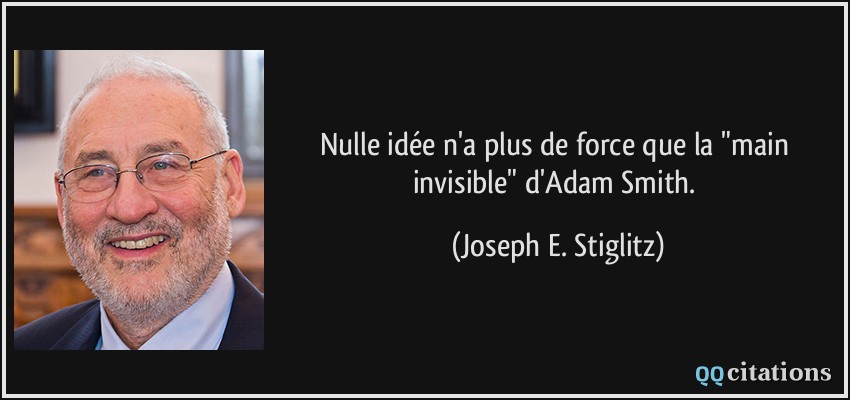


Nulle Idee N A Plus De Force Que La Main Invisible D Adam Smith



No Complaint Is More Common Than Tha Adam Smith About Money
This "Cited by" count includes citations to the following articles in Scholar Adam Smith Professor of Computer Science, Boston University Verified email at buedu Homepage R Bassily, K Nissim, A Smith, T Steinke, U Stemmer, J Ullman



Quote Of The Day Quote Of The Day Quote Citation Quotes



An Inquiry Into The Nature And Causes Of The Wealth Of Nations Cannan Ed Vol 1 Online Library Of Liberty



La Citation Du Mois Adam Smith
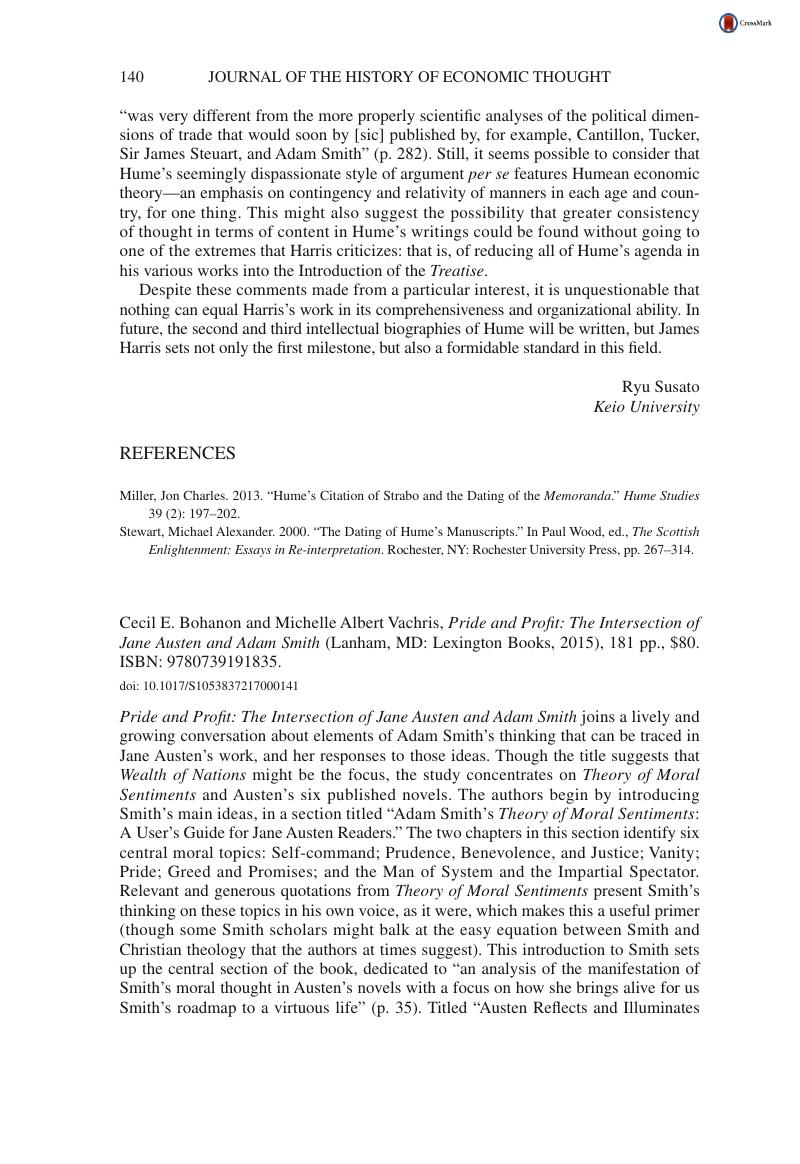


Cecil E Bohanon And Michelle Albert Vachris Pride And Profit The Intersection Of Jane Austen And Adam Smith Lanham Md Lexington Books 15 181 Pp 80 Isbn Journal Of The



Adam Smith Quotes About Work Whatever Work He Does Beyond What Is Sufficient To Purchase His Dogtrainingobedienceschool Com



Magazine Sciences Humaines Citation De La Semaine A Lire Sur Sciences


Ambassador Lee Meets Rep Adam Smith 상세보기 Ambassador S Activitiesembassy Of The Republic Of Korea In The Usa



Adam Smith Wealth Of Nations Invisible Hand Book Biography
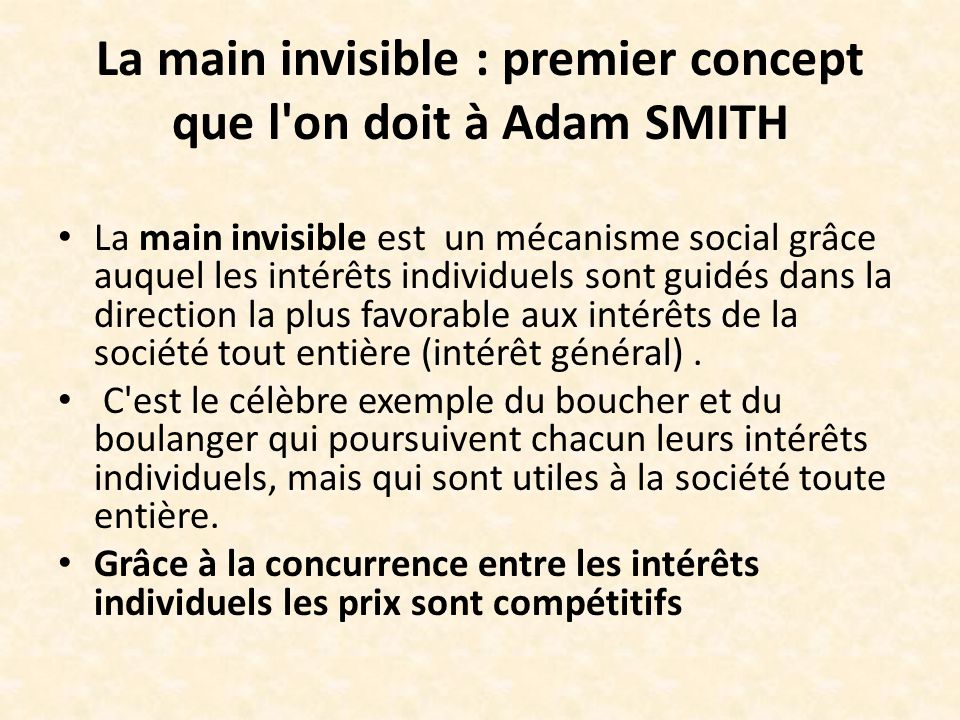


Proposition 4 Discussion



Libreoffice Writer Plugin Usage Zotero Documentation



Pdf On Adam Smith S Wealth Of Nations And The Continental French Intellectual Connection There Was A Small Intellectual Connection



Epingle Sur Citations



Pdf Did Adam Smith Miss The Chance To State The Goal And Structure Of Sustainability Markets In His Time If Yes Which Could Be Some Of The Possible Reasons Behind That



Citation Adam Smith Pere Un Pere S Occupe Plus De Dix Enfants Que Dix Enfants
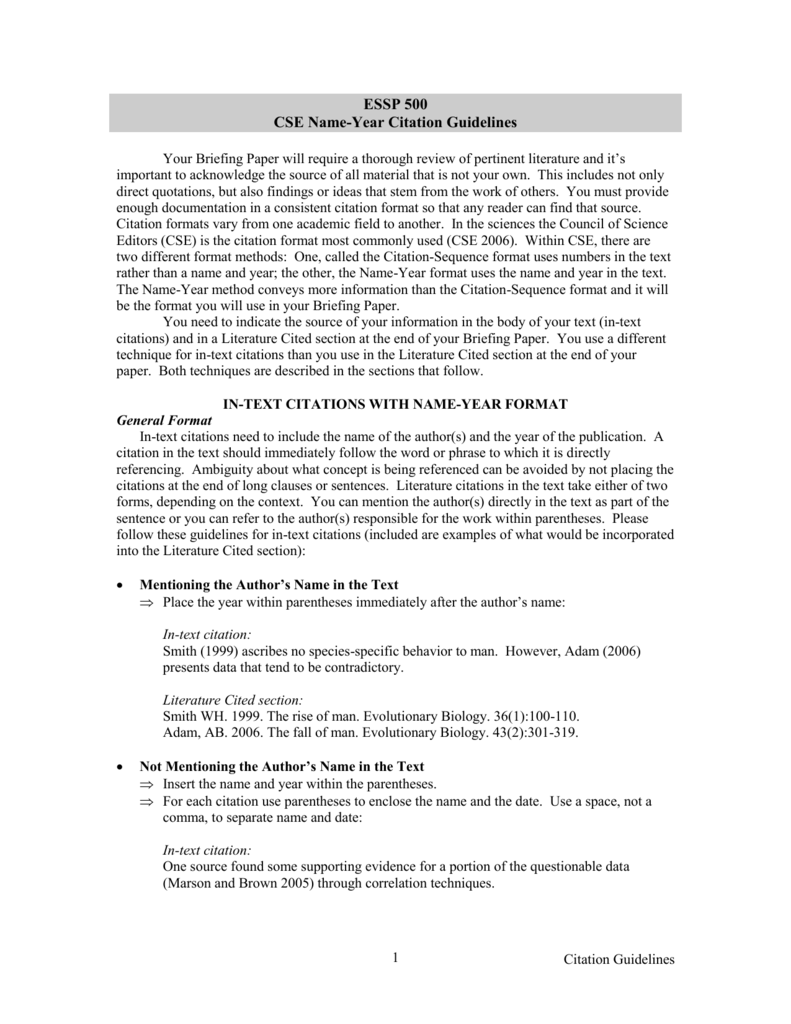


Sep Citation Guidelines



It Is The Fear Of Losing Their Employment Which Restrains His Frauds And Corrects His Negligence Kwize



The Rise Of Adam Smith Articles And Citations 1970 1997 Semantic Scholar



Adam Smith Citation T Shirt Zazzle Fr



What Are The Most Cited Publications In The Social Sciences According To Google Scholar Impact Of Social Sciences
18_Part_1)


21 Rashid S The Myth Of Adam Smith Emerald Insight



Citation And Referencing In Research 31 Abdul Majid Ansari Youtube



What Is Prudence In The Conduct Of Every Private Family Can Scarce Be Folly In That Of A Great Kingdom Kwize



Top Pdf Adam Smith The Wealth Of Nations 1library


Citations Adam Smith



Pdf Adam Smith Market And Social Change Then And Now



Labor Was The First Price The Original Adam Smith About Money



Home Adam Smith I Jet Sales Acquisitions



Adam Smith S Seventeenth Century Sources Tema Nauchnoj Stati Po Filosofii Etike Religiovedeniyu Chitajte Besplatno Tekst Nauchno Issledovatelskoj Raboty V Elektronnoj Biblioteke Kiberleninka
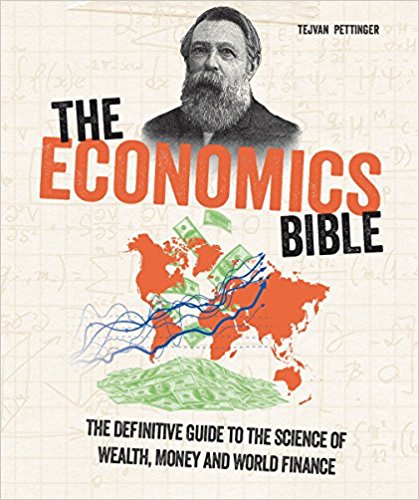


Adam Smith Biography Biography Online



A Data Citation Roadmap For Scholarly Data Repositories Scientific Data



A Merchant It Has Been Said Very Properly Is Not Necessarily The Citizen Of Any Particular Country Kwize



How To Use Internal Citations With Pictures Wikihow



George Yarrow 1 This Is A Long Citation From A Great Scottish Scholar Adam Smith But Please Bear With It It Could Almost Have Been Written For This Hour And



Adam Smith Quotes Ryan Adam Smith Famous Quotes Sayings Dogtrainingobedienceschool Com



Creating Mla In Text Citations Bibliography Com



Mla Citation Style An Overview Mla Handbook 7 Th Ed Pdf Free Download



Top Pdf Adam Smith The Wealth Of Nations 1library



How To Use Internal Citations With Pictures Wikihow


Adam Smith آرتا دانش بین المللی



Poeb1 Adam Smith Principles Of Economics 1 6011p00w Studocu



Le Travail Est Le Premier Prix L Achat Original Argent Verse Pour Toutes Choses C Etait Adam Smith Citations



Adam Smith The Wealth Of Nations Philpapers



Plus De 0 Adam Smith Citation Galerie De Citations Sages



Adam Smith 4 Motif Citation Tirage D Art Sur Toile Amazon Fr Cuisine Maison



Citation Adam Smith Citation Inspiration Com



Labour Is The Real Measure Of The Exchangeable Value Of All Commodities Kwize



George Adam Smith Wikipedia



A Ppe Approach To Adam Smith On Spectatorship And The Social Origins Of Property Rights Emerald Insight



Pdf Understanding The Death And Paradigm Shift Of Adam Smith S Model Was Going Green The Only Option If Not Is This Option The Most Sustainable One
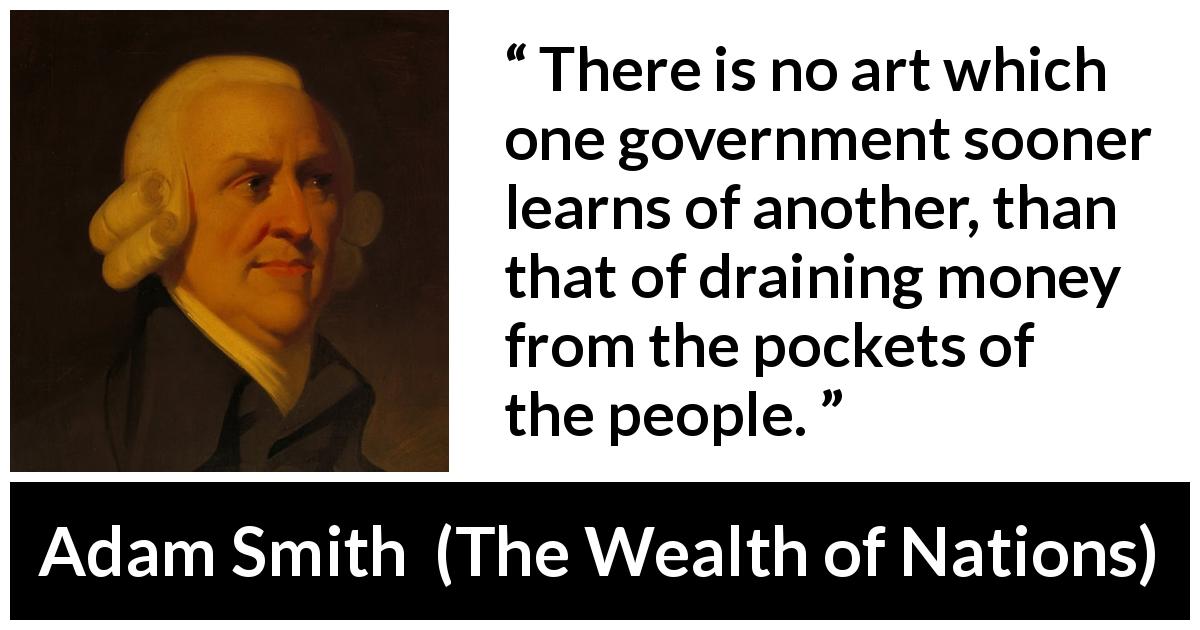


There Is No Art Which One Government Sooner Learns Of Another Than That Of Draining Money From The Pockets Of The People Kwize



Pdf Download The Wealth Of Nations Illustrated Jubilee Edition Pdf Full Collection By Adam Smith Ndsihdsdsbdisdshdsfsd



Adam Smith Biography Books Facts Britannica



Pdf Adam Smith And The Modern Science Of Ethics Semantic Scholar



Adam Smith Wikipedia



No comments:
Post a Comment